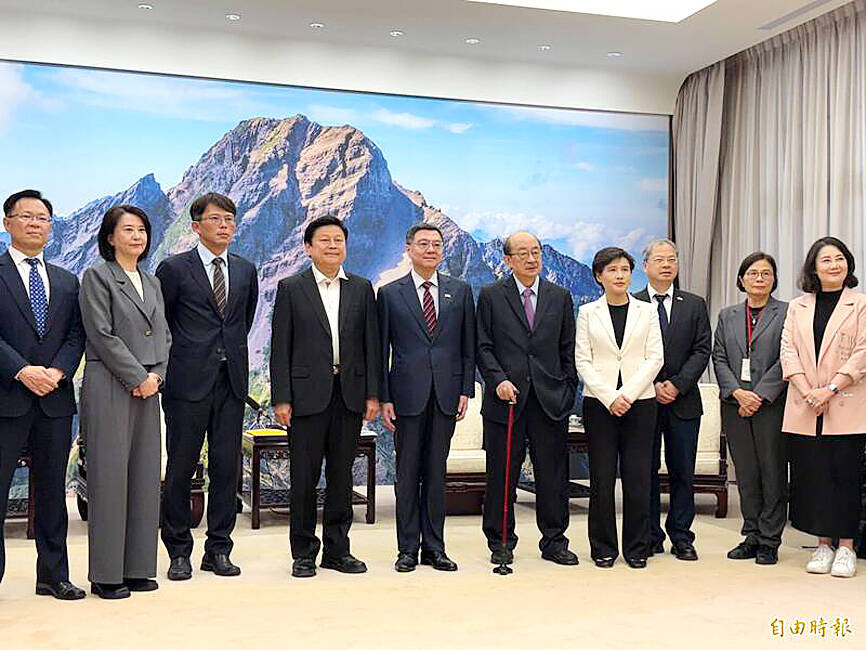Premier Cho Jung-tai (卓榮泰) yesterday agreed to deliver a report to the legislature on the impact of US tariffs on the economy and the Executive Yuan’s countermeasures.
In reaction to US President Donald Trump’s 32 percent tariff on imports from Taiwan, the stock market posted its biggest intraday plunge at the opening yesterday.
Cho at 2pm convened a meeting at the Executive Yuan with the legislative caucuses of all parties to discuss national affairs, with a focus on the US tariffs facing Taiwan.

Photo: Chung Li-hua, Taipei Times
An attendee, who wished to remain anonymous, said Cho, in response to being asked to make a report to the legislature, agreed and said that the date for the report could be decided via a cross-caucus negotiation.
He added that the legislature should allow more time for the Executive Yuan to observe stock market fluctuations and conceive optimal strategies before making the report, they said.
Chinese Nationalist Party (KMT) caucus whip Fu Kun-chi (傅?萁) told reporters after the meeting that the US’ “reciprocal” tariffs could be considered a national crisis that requires prompt resolution, as the policy battered the stock market and threatens almost all industries nationwide.
Cho should report on the situation at the legislature to make known what industries are severely impacted and what the countermeasures would be, he said.
The KMT caucus would do its best to provide assistance and expect the government to use not only the special budget of NT$88 billion (US$2.66 billion), but also the NT$143.9 billion budget cuts to support affected industries, he said.
Taiwan People’s Party (TPP) Chairman Huang Kuo-chang (黃國昌) said the TPP caucus would prioritize the national interest and help evaluate whether the Executive Yuan’s strategies are feasible in resolving the problems.
Legislative Speaker Han Kuo-yu (韓國瑜) did not attend the meeting due to a tight schedule, but he sent a notice for a cross-caucus negotiation to be held this afternoon to discuss the matter.
In a related development, Vice Premier Cheng Li-chun (鄭麗君), tapped to head the negotiation team as President William Lai (賴清德) looks to seek more preferable tariffs with Washington, yesterday said that aside from seeking to lower the tariffs on some goods, an agricultural procurement team would be sent to the US in August and September to conduct procurement, which is expected to scale up.
The industrial procurement team, which has been suspended, would also be resumed, she said.

Taiwan is projected to lose a working-age population of about 6.67 million people in two waves of retirement in the coming years, as the nation confronts accelerating demographic decline and a shortage of younger workers to take their place, the Ministry of the Interior said. Taiwan experienced its largest baby boom between 1958 and 1966, when the population grew by 3.78 million, followed by a second surge of 2.89 million between 1976 and 1982, ministry data showed. In 2023, the first of those baby boom generations — those born in the late 1950s and early 1960s — began to enter retirement, triggering

One of two tropical depressions that formed off Taiwan yesterday morning could turn into a moderate typhoon by the weekend, the Central Weather Administration (CWA) said yesterday. Tropical Depression No. 21 formed at 8am about 1,850km off the southeast coast, CWA forecaster Lee Meng-hsuan (李孟軒) said. The weather system is expected to move northwest as it builds momentum, possibly intensifying this weekend into a typhoon, which would be called Mitag, Lee said. The radius of the storm is expected to reach almost 200km, she said. It is forecast to approach the southeast of Taiwan on Monday next week and pass through the Bashi Channel

NO CHANGE: The TRA makes clear that the US does not consider the status of Taiwan to have been determined by WWII-era documents, a former AIT deputy director said The American Institute in Taiwan’s (AIT) comments that World War-II era documents do not determine Taiwan’s political status accurately conveyed the US’ stance, the US Department of State said. An AIT spokesperson on Saturday said that a Chinese official mischaracterized World War II-era documents as stating that Taiwan was ceded to the China. The remarks from the US’ de facto embassy in Taiwan drew criticism from the Ma Ying-jeou Foundation, whose director said the comments put Taiwan in danger. The Chinese-language United Daily News yesterday reported that a US State Department spokesperson confirmed the AIT’s position. They added that the US would continue to

The number of Chinese spouses applying for dependent residency as well as long-term residency in Taiwan has decreased, the Mainland Affairs Council said yesterday, adding that the reduction of Chinese spouses staying or living in Taiwan is only one facet reflecting the general decrease in the number of people willing to get married in Taiwan. The number of Chinese spouses applying for dependent residency last year was 7,123, down by 2,931, or 29.15 percent, from the previous year. The same census showed that the number of Chinese spouses applying for long-term residency and receiving approval last year stood at 2,973, down 1,520,